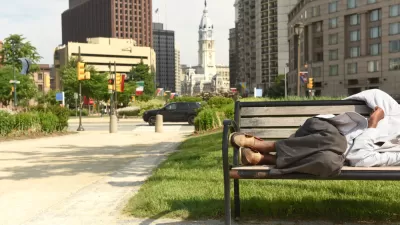The tragic deaths of six people in last week's downtown building collapse have prompted Philadelphia City Council President Darrell L. Clarke to revive a bill he originally sponsored 13 years ago that would penalize owners of vacant properties.
"Following the catastrophic building collapse at 22d and Market Streets, Philadelphia City Council President Darrell L. Clarke resurrected a bill Thursday to punish speculators for holding on to vacant, often dilapidated, properties," reports Troy Graham. "The bill would create a 'non-utilization tax,' which would charge an owner 10 percent of a property's assessed value after it had been vacant for more than a year."
"The tax would increase in each of the next two years of vacancy, and again after five and 10 years of vacancy," explains Graham. "The goal would be to encourage owners either to develop or sell vacant properties."
"Clarke sponsored a bill to set up a similar tax in 2000. It passed but was never enforced due to questions of legality."
In related news, the operator of an excavator that was working on the building site on the day of the collapse has been charged with six counts of involuntary manslaughter, report Mike Newall and Aubrey Whelan. Sean Benschop, who is said to have began working at the site two weeks ago, reportedly tested positive for recent marijuana use after the collapse. "A law enforcement source said Benschop had used the excavator to remove a second-story beam just seconds before the building toppled onto the shop."
FULL STORY: Clarke plans bill on vacant properties

Alabama: Trump Terminates Settlements for Black Communities Harmed By Raw Sewage
Trump deemed the landmark civil rights agreement “illegal DEI and environmental justice policy.”

Planetizen Federal Action Tracker
A weekly monitor of how Trump’s orders and actions are impacting planners and planning in America.

The 120 Year Old Tiny Home Villages That Sheltered San Francisco’s Earthquake Refugees
More than a century ago, San Francisco mobilized to house thousands of residents displaced by the 1906 earthquake. Could their strategy offer a model for the present?

In Both Crashes and Crime, Public Transportation is Far Safer than Driving
Contrary to popular assumptions, public transportation has far lower crash and crime rates than automobile travel. For safer communities, improve and encourage transit travel.

Report: Zoning Reforms Should Complement Nashville’s Ambitious Transit Plan
Without reform, restrictive zoning codes will limit the impact of the city’s planned transit expansion and could exclude some of the residents who depend on transit the most.

Judge Orders Release of Frozen IRA, IIJA Funding
The decision is a victory for environmental groups who charged that freezing funds for critical infrastructure and disaster response programs caused “real and irreparable harm” to communities.
Urban Design for Planners 1: Software Tools
This six-course series explores essential urban design concepts using open source software and equips planners with the tools they need to participate fully in the urban design process.
Planning for Universal Design
Learn the tools for implementing Universal Design in planning regulations.
Clanton & Associates, Inc.
Jessamine County Fiscal Court
Institute for Housing and Urban Development Studies (IHS)
City of Grandview
Harvard GSD Executive Education
Toledo-Lucas County Plan Commissions
Salt Lake City
NYU Wagner Graduate School of Public Service




























